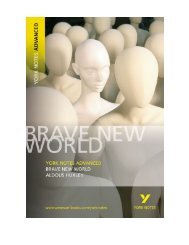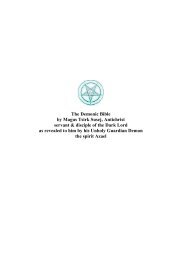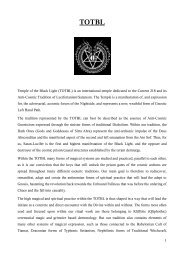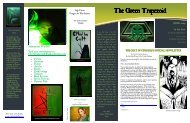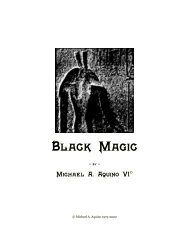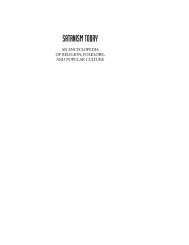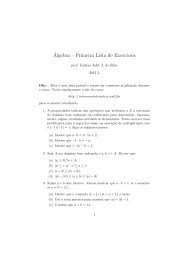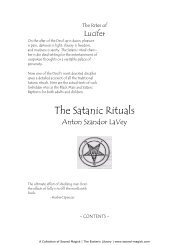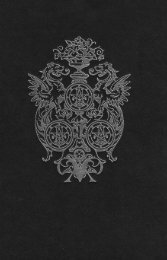I. VAMA MARGA Foundations Of The Left-Hand Path - staticfly.net
I. VAMA MARGA Foundations Of The Left-Hand Path - staticfly.net
I. VAMA MARGA Foundations Of The Left-Hand Path - staticfly.net
Create successful ePaper yourself
Turn your PDF publications into a flip-book with our unique Google optimized e-Paper software.
lines, eschewing such traditional props as written ritual texts, and customary,<br />
161<br />
supposedly obligatory ritual props, such as bells, candles, robes, pentagrams<br />
and the like. In the pure magical opera of the working, the magician seeks to<br />
keep such extraneous devices to a bare minimum, drawing on the stark<br />
powers of the mind and body alone to effect one's magical will in the world.<br />
<strong>The</strong> word ritual tends to imply a well-rehearsed, systematic "acting out" of<br />
religious or metaphysical symbolism, little different than the extravagant but<br />
empty mummery practiced by organized religions in their places of worship.<br />
While magic can most certainly be a religious experience, in the truest sense<br />
of the term, it should never be the kind of religious experience that merely<br />
comforts by going through the motions of a routine. Our somewhat more<br />
clinical use of the word "working" suggests a more unconfined manipulation<br />
of magical energy, involving direct encounter with the numinous, as<br />
unencumbered by habitual response or the reliance on familiar magical<br />
crutches as possible.<br />
Even more to be avoided than the customary orthodoxy of repetitive<br />
ritual is ceremony, which can only imply the reenactment of proscribed rites<br />
ordained by law, entrenched by custom, and performed according to an<br />
unbending set of rules. <strong>The</strong> formula and recipe of ceremony are certain<br />
death for the vitality of the left-hand path magician, who remains vigilant<br />
through an experimental, ever-changing reinvention of magical strategy.<br />
Most ritual and ceremonial magic is static, relying on the tried and true<br />
instead of venturing out into new and unexplored directions. While the left<br />
hand hand path initiate may wish to observe certain ceremonial occasions,<br />
such as weddings, funerals, and. other rites of observance and celebration,<br />
even these should not he the simple recitation of text enjoined by profane<br />
society. Such rites should always be magical workings in and of themselves<br />
that cause action and change in the self and in the outer world.<br />
<strong>The</strong> Daemonic<br />
We have already referred several times to the Daemonic, another word<br />
easily misinterpreted if taken at face value. One may understandably assume<br />
that we refer to the putative evil spirits or infernal beings that Christian<br />
theologians and traditional demonologists so often direct their fulminations<br />
against. Since this study scrupulously shuns the entire worldview implied by<br />
use of the simplistic good/evil dichotomy, and the authors don't accept the<br />
existence of evil as a force that exists outside of culturally determined value<br />
judgments nor the existence of an inferno populated with malign bat-winged<br />
entities, our reference to the Daemonic is something altogether on a different<br />
plane. Yet again, we return to the original source of the word in the Greek<br />
language, which offers a richer and thus more useful definition for the<br />
magician than the limiting Christianized definition.<br />
<strong>The</strong> word "Daemon", from the Greek daimon, originally carried no<br />
162<br />
pejorative implication or connection with evil. It merely referred to a kind of<br />
protective spirit or demi-divinity thought to be associated with each<br />
individual. Deriving from daiomai or "I distribute", the daemon was<br />
considered as a literal distributor of fate. Daemon has also been defined as<br />
"replete with wisdom", and in this regard, the daemon was also deeply<br />
connected to the Roman concept of the genius, a god that presided over<br />
one's birth. Persons of remarkable talent or extraordinary accomplishment<br />
were considered to be guided by a Daemon or Genius, just as the concept of<br />
Genius loci is still used to describe the distinctive spirit of a specific place.<br />
Perhaps the most illustrious historical example of this is Socrates, who<br />
claimed that he heard the voice of a daemon, or genius, that guided his life.<br />
According to R.B. Onians, in his <strong>The</strong> Origins <strong>Of</strong> European Thought, the<br />
word "genius" was originally the Roman equivalent of the Greek psyche,<br />
described as "the life-spirit active in procreation, disassociated from and



